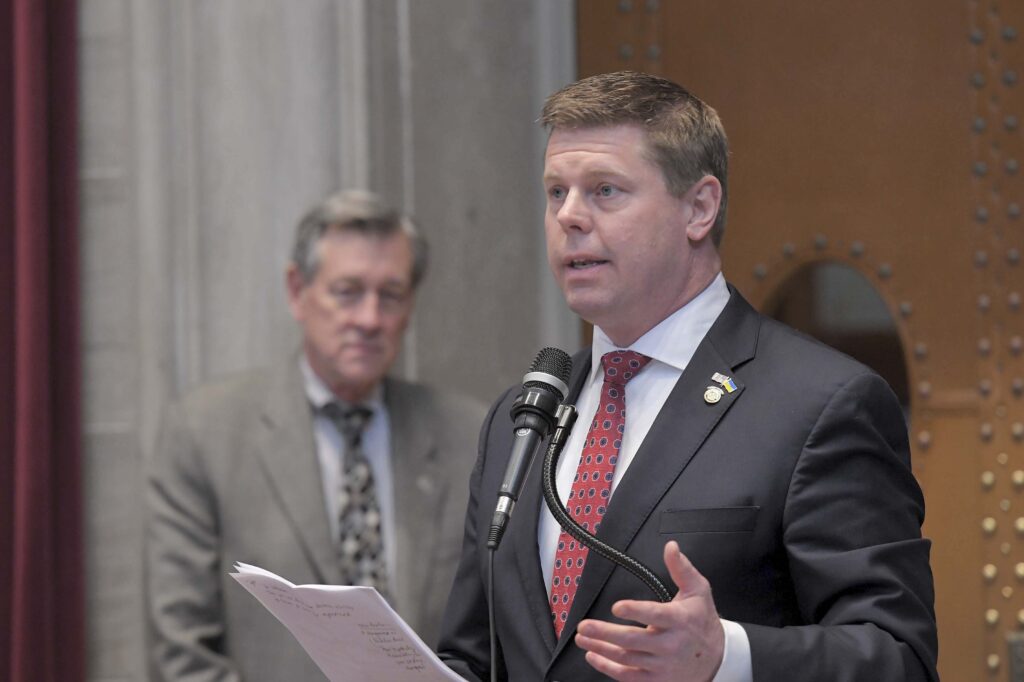Home » News » 2024 » April
News Brief
April 17, 2024 |
By: Jason Hancock - Missouri Independent
Dean Plocher delayed ethics investigation he publicly complained dragged on too long

By Jason Hancock - Missouri Independent
Missouri House Speaker Dean Plocher and his allies complained for weeks that the ethics investigation into his alleged misconduct was dragging out unnecessarily.
As it turns out, the biggest reason for the delay may have been Dean Plocher himself.
The Republican from Des Peres for three months refused to speak to an attorney hired by the House to collect evidence for the investigation, only agreeing to testify to the ethics committee in mid-March.
His office three times over the course of March and early April refused to sign off on subpoenas requested by the committee to compel hesitant witnesses to come forward.
While all this was taking place behind the scenes and out of the public view, Plocher was arguing to colleagues and the media that the committee was taking too long. The delays became evidence to his supporters that the investigation was political and illegitimate.
“Not soon enough,” Plocher said, when asked last month about when the committee might finish its work.
On Monday, after a draft report was released documenting the ethics committee’s findings, Plocher told the St. Louis Post-Dispatch that he was disappointed in how long the committee took to complete its work.
Yet the report in question lays out myriad ways Plocher’s actions in private were allegedly causing the delays he was publicly decrying.
“Never did I imagine the biggest impediment to this process would be the speaker’s office,” Republican state Rep. Hannah Kelly, the chair of the ethics committee who Plocher appointed to the job in 2023, posted on social media Tuesday.
Plocher, who is running for secretary of state, has yet to publicly comment on the contents of the ethics committee’s draft report.
The committee began looking into Plocher in October, after an ethics complaint filed by Republican state Rep. Chris Sander of Lone Jack that focused on the speaker’s advocacy for the House to enter into a six-figure software contract with a private company, his firing of a former staffer and his years of false expense reimbursement reports.
The committee retained an outside attorney named Beth Boggs on Dec. 6 to investigate the allegations and provide a written report to the committee.
Boggs attempted to speak to Plocher for months, she wrote in a March 1 letter to the committee. But each of her requests were ignored. Additionally, Boggs wrote that numerous witnesses refused to cooperate out of fear of retaliation from the speaker’s office.
Those roadblocks, Boggs wrote, delayed the committee’s efforts.
“The level of fear expressed by a number of the potential witnesses is a daunting factor in completing this investigation,” Boggs wrote.
Some witnesses who refused to willingly testify to the committee indicated they would comply with a subpoena, the report stated. Yet records included in the report show that on three occasions, Plocher’s general counsel wrote to the committee stating that the speaker’s office would not sign off on those subpoenas.
“The inability to compel witness testimony and the production of documents in a timely fashion caused unnecessary delay and has hindered the committee’s investigation,” the report stated.
The report ultimately concluded the committee lacked direct evidence of ethical misconduct by Plocher, but that his actions “substantially impair public confidence in the General Assembly.” It recommended a formal letter of disapproval for Plocher, that he hire an accounting professional to manage his expense reports moving forward and that he refrain from retaliation against any legislator or House employee who cooperated with the committee.
The report also recommended further review by the House into allegations of threats made against legislative employees during the course of the investigation.
But after Kelly refused to allow the committee to go into closed session to debate the report, which she said was the result of hours of debate last week, four Democrats and two Republicans voted to reject it.
Only Kelly and the committee’s vice chair, Democratic state Rep. Robert Sauls of Independence, voted in support.
“Unfortunately, because of the efforts by the speaker to threaten witnesses, block our investigation and prevent this process from reaching its natural conclusion, there is nothing more that can be done,” Kelly posted on social media Tuesday. “The report speaks for itself, as do the votes of the committee members.”
One member of the committee, Republican state Rep. Cyndi Buchheit-Courtway of Festus, voted “present” on Monday.
The next day, she posted on social media arguing that the report “did not accurately reflect the record of the committee investigation.”
She voted “present” out of respect for Kelly, Buchheit-Courtway wrote, but wanted more debate before a report was released to the public. The committee majority, she argues, should write, debate and adopt a final report before a public release.
“This process has gone on too long,” she wrote, “and needs to come to an end.”
Buchheit-Courtway may get her wish for an end to the investigation.
Kelly adjourned Monday’s hearing immediately after the committee rejected the report. Two other hearings scheduled for this week have been canceled. There is no indication of whether the committee’s work might resume.
The legislative session ends May 17 at 6 p.m.
“It breaks my heart,” Kelly wrote, “to think our institution could be a place where victims will be harassed rather than protected, where whistleblowers will be vilified and where the truth will be something that is locked in the darkness rather than brought into the light of day.”
![]()






